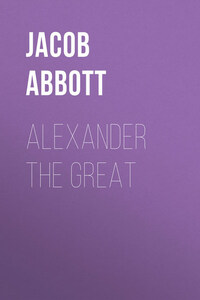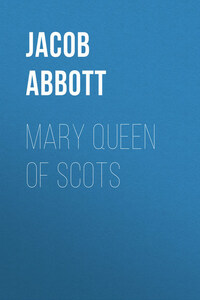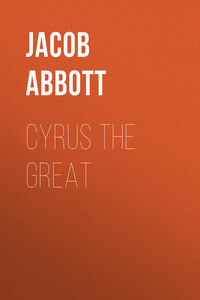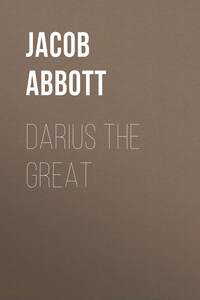The history of the life of every individual who has, for any reason, attracted extensively the attention of mankind, has been written in a great variety of ways by a multitude of authors, and persons sometimes wonder why we should have so many different accounts of the same thing. The reason is, that each one of these accounts is intended for a different set of readers, who read with ideas and purposes widely dissimilar from each other. Among the twenty millions of people in the United States, there are perhaps two millions, between the ages of fifteen and twenty-five, who wish to become acquainted, in general, with the leading events in the history of the Old World, and of ancient times, but who, coming upon the stage in this land and at this period, have ideas and conceptions so widely different from those of other nations and of other times, that a mere republication of existing accounts is not what they require. The story must be told expressly for them. The things that are to be explained, the points that are to be brought out, the comparative degree of prominence to be given to the various particulars, will all be different, on account of the difference in the situation, the ideas, and the objects of these new readers, compared with those of the various other classes of readers which former authors have had in view. It is for this reason, and with this view, that the present series of historical narratives is presented to the public. The author, having had some opportunity to become acquainted with the position, the ideas, and the intellectual wants of those whom he addresses, presents the result of his labors to them, with the hope that it may be found successful in accomplishing its design.
Chapter I.
His Childhood and Youth
B.C. 356-336
The briefness of Alexander's career.
Alexander the Great died when he was quite young. He was but thirty-two years of age when he ended his career, and as he was about twenty when he commenced it, it was only for a period of twelve years that he was actually engaged in performing the work of his life. Napoleon was nearly three times as long on the great field of human action.
Notwithstanding the briefness of Alexander's career, he ran through, during that short period, a very brilliant series of exploits, which were so bold, so romantic, and which led him into such adventures in scenes of the greatest magnificence and splendor, that all the world looked on with astonishment then, and mankind have continued to read the story since, from age to age, with the greatest interest and attention.
Character of Alexander.
Mental and physical qualities.
The secret of Alexander's success was his character. He possessed a certain combination of mental and personal attractions, which in every age gives to those who exhibit it a mysterious and almost unbounded ascendency over all within their influence. Alexander was characterized by these qualities in a very remarkable degree. He was finely formed in person, and very prepossessing in his manners. He was active, athletic, and full of ardor and enthusiasm in all that he did. At the same time, he was calm, collected, and considerate in emergencies requiring caution, and thoughtful and far-seeing in respect to the bearings and consequences of his acts. He formed strong attachments, was grateful for kindnesses shown to him, considerate in respect to the feelings of all who were connected with him in any way, faithful to his friends, and generous toward his foes. In a word, he had a noble character, though he devoted its energies unfortunately to conquest and war. He lived, in fact, in an age when great personal and mental powers had scarcely any other field for their exercise than this. He entered upon his career with great ardor, and the position in which he was placed gave him the opportunity to act in it with prodigious effect.
Character of the Asiatic and European civilization.
There were several circumstances combined, in the situation in which Alexander was placed, to afford him a great opportunity for the exercise of his vast powers. His native country was on the confines of Europe and Asia. Now Europe and Asia were, in those days, as now, marked and distinguished by two vast masses of social and civilized life, widely dissimilar from each other. The Asiatic side was occupied by the Persians, the Medes, and the Assyrians. The European side by the Greeks and Romans. They were separated from each other by the waters of the Hellespont, the Ægean Sea, and the Mediterranean, as will be seen by the map. These waters constituted a sort of natural barrier, which kept the two races apart. The races formed, accordingly, two vast organizations, distinct and widely different from each other, and of course rivals and enemies.
Composition of Asiatic and European armies.
It is hard to say whether the Asiatic or European civilization was the highest. The two were so different that it is difficult to compare them. On the Asiatic side there was wealth, luxury, and splendor; on the European, energy, genius, and force. On the one hand were vast cities, splendid palaces, and gardens which were the wonder of the world; on the other, strong citadels, military roads and bridges, and compact and well-defended towns. The Persians had enormous armies, perfectly provided for, with beautiful tents, horses elegantly caparisoned, arms and munitions of war of the finest workmanship, and officers magnificently dressed, and accustomed to a life of luxury and splendor. The Greeks and Romans, on the other hand, prided themselves on their compact bodies of troops, inured to hardship and thoroughly disciplined. Their officers gloried not in luxury and parade, but in the courage, the steadiness, and implicit obedience of their troops, and in their own science, skill, and powers of military calculation. Thus there was a great difference in the whole system of social and military organization in these two quarters of the globe.














